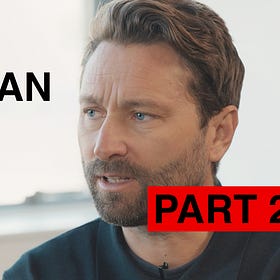What is neoliberalism? Episode #15 with guest Quinn Slobodian is out today.
When I first started writing about radical online politics, many readers hesitated to take unusual topics such as LARP and fantasy world-building as a serious political force. In 2025, Javier Milei, a cosplaying anarcho-capitalist, is the president of Argentina and the New York Times is profiling Curtis Yarvin, the blogger-philospher behind neo-monarchy. (At this rate, we’re six months out from the God Emperor Trump meme becoming real too.)
Many of us are unfamiliar with the actual philosophies and practices of the radical groups that are now reshaping our political reality. Literally, these guys love doing cosplay — I have to state this very clearly because it sounds so ridiculous. Similarly, Balaji Srnivasan, author of The Network State, describes LARPing Bitcoin (now valued at over 100,000 dollars) into a real currency. Soon, he intends to harness this power of a shared political imaginary and transform governance itself into a cloud based platform. Fringe ideas are no longer fanciful theories but have become real political projects. Today’s episode explores the deep history of neoliberalism, our current political transformation and its clear continuity with the ideological vision that began in the 1930s.
Quinn Slobodian is a professor of international history at Boston University. His books, which have been translated into ten languages, include Globalists: The End of Empire and the Birth of Neoliberalism, published by Harvard University Press in 2018, Crack-Up Capitalism: Market Radicals and the Dream of a World Without Democracy, published by Metropolitan in 2023, and his forthcoming Hayek’s Bastards: Race, Gold, IQ and the Capitalism of the Far Right to be released by Zone books later this year.
Slobodian has been an associate fellow at Chatham House and held residential fellowships at Harvard and the Free University of Berlin. He is a co-director of the History and Political Economy Project and is on the board of editors of the American Historical Review. Prospect UK named him one of the World’s 25 Top Thinkers in 2024. He is considered by many to be the world’s foremost historian on the subject of Neoliberalism.
A quick reminder, I’m writing to you as the actual guy who does this show. There is no big foundation, wealthy donor or organization behind this — its just me and a few friends. If you think this exploration of extremely online culture and politics is important, you can help us keep going by becoming a paid subscriber. My goal is to produce the best quality video interviews that exist online with the guests that I consider to be the most important voices of this moment. As long as this show exists, I’ll be the voice behind all editorial decisions and you’re always going to hear from me directly. For $6 you can help make new episodes of the best podcast on the internet:
This week, my guest is historian Quinn Slobodian. We discuss:
The origins of neoliberalism. What is it? When did it begin? How did it transform global politics?
Peter Thiel’s libertarian seasteading project and his desperate attempt to escape regulatory control by venturing out into international waters (this is real).
How special economic zones drive capital flight, erode social democracy and literally remap state sovereignty. This multi-decade process mirrors some real world examples happening today. Important legal precedents are now being set.
Exit, voice and the politics of the 21st century. Is there a future for democracy?
Quinn Slobodian’s work explores the most important questions of our era. Importantly, he has the courage to approach these subjects with the necessary cultural, historical and philosophical scope that can meet today’s rapidly expanding Overton window. The actual history of neoliberalism may surprise and reframe many of your existing assumptions. Its roots go back much further than one might expect and its vision is far grander than we are often lead to assume. If you like this episode, I strongly encourage you to read Quinn’s books Globalists and Crack Up Capitalism. These are the texts I most frequently reference when describing today’s political crises.
You can watch the full episode here:
Quinn Slobodian: What is Neoliberalism? | Doomscroll
In addition to today’s public episode you can also find a bonus episode for subscribers only below. Paid subscribers will get access to the second video and audio episode as well as the full catalog of past episodes:
Doomscroll: Quinn Slobodian II
This is a subscribers only episode. My guest is Quinn Slobodian. We discuss the crisis of the 1970s and the 2020s. Of all the open theoretical debates, these periods are by far the most consequential. The analysis we take away from these periods will help determine whether neoliberalism was a project of class war (something that can be reversed) or an i…
Doomscroll: Will Menaker II
This is a subscriber’s only episode. My guest is Will Menaker. We discuss “based populism”, the power of comedy in politics, and the realignment of counter-culture in America.
Doomscroll: Dasha Nekrasova II
This is a subscriber’s only episode. My guest is Dasha Nekrasova. We discuss Trump’s historic victory, counter elites, the class interest of precarious freelancers and the state of creative industries today.





That was a fantastic listen. Although a lot of it went over my head to b honest.